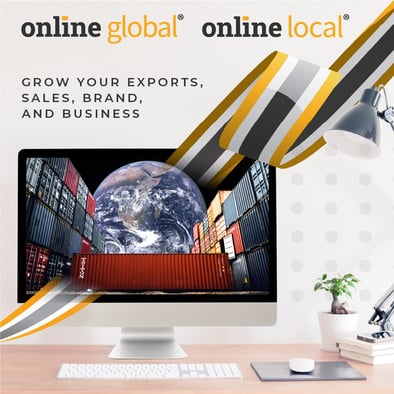
In the fast-paced realm of international ecommerce, smaller American exporters often grapple with the challenge of establishing a successful ecommerce presence in global markets.
While your own e-commerce website platforms (think WooCommerce, and Shopify) may seem like the default choice, the process can be a demanding endeavor in terms of resources, both management and budgetary. In this blog post, we explore a more efficient route for smaller exporters looking to dip their toes into the expansive world of e-commerce exports—leveraging international marketplaces.
- The Challenge of your Own Ecommerce Website: For small exporters with sales under approximately USD$3 million, and much smaller operating budgets, building and managing their own e-commerce platform is resource-intensive. From design and development to ongoing maintenance, the process demands considerable management expertise, time, effort, and financial investment.
- Enter International Ecommerce Marketplaces: A more accessible and cost-effective alternative for small exporters lies in leveraging the many international ecommerce marketplaces. Platforms like Amazon, Alibaba, eBay, and others provide a ready-made infrastructure, connecting businesses with a global audience without the complexities of maintaining an independent website. In addition to global giants, consider regional marketplaces that dominate specific geographical areas and industrial sectors. Global Sources is a Hong Kong-based B2B platform that connects buyers with suppliers, primarily from Asia. Mercado Libre is a key player in Latin America. TradeIndia is one of India's largest online B2B marketplaces. ThomasNet, is a leading platform for industrial sourcing. MedicalExpo is an online exhibition platform focused on medical and healthcare products. Machinery Marketplace platforms, such as Machinio and MachineryTrader, specialize in buying and selling industrial machinery and equipment.
- Benefits of International Ecommerce Marketplaces:
- Global Reach: International marketplaces offer instant exposure to a diverse international customer base. Small exporters can showcase their products to a global audience without the need for extensive marketing efforts.
- Reduced Costs: Unlike your own websites, where costs can quickly add up, international marketplaces often operate on a fixed cost and/or commission-based model. Small businesses pay monthly fees, making it a more budget-friendly option.
- Infrastructure and Security: Marketplaces provide a secure and reliable infrastructure for transactions. Small exporters can benefit from the robust security measures implemented by these platforms, ensuring a safe environment for online sales.
- Built-in Marketing: International marketplaces sometimes come with limited built-in marketing tools. This helps products gain visibility on the platform.
- Streamlined Logistics: Marketplaces often have established logistics and shipping solutions. Small exporters can tap into these streamlined processes, ensuring efficient order fulfillment and delivery to customers worldwide.
- Getting Started: To kickstart your journey on international marketplaces, begin by researching which platforms align with your target markets and product categories. Consider factors such as platform fees, audience demographics, and available marketing tools.
Tips for Success: -
- Optimize Product Listings: Craft compelling product descriptions, utilize high-quality images, and optimize your listings for search within the marketplace.
- Understand Marketplace Policies: Familiarize yourself with the rules and policies of each marketplace to ensure compliance and avoid potential issues.
- Responsive Customer Service: Maintain prompt and responsive customer service to build trust with international buyers.
- Limitations of International Ecommerce Marketplaces: While international ecommerce marketplaces offer a starter gateway to global markets, they come with limitations. Strategically, you are not investing, building, creating and owning your international ecommerce presence. Businesses encounter competition within the platform, so it's crucial to spend on marketing and product differentiation, which reduce margins and profitability. Sellers face restrictions on branding, customization and access to their business development data. Understanding these limitations is essential for small exporters to strategize effectively and, when the time is right, consider investing in their own e-commerce platform.
- Your Own International E-commerce Platforms: When your business has grown to sales approx. $5M+, and you have the resources including management time, expertise, and financial, it is time to invest in your own ecommerce website(s). Strategically, you will create and retain that long-term business value, measured by assets in your balance sheet, and the worth of your company. WooCommerce, Shopify and other own ecommerce platforms, provide solutions. Your own ecommerce websites give you control over every aspect of your ecommerce business, including the customer experience, branding, marketing, sales and perhaps most importantly the data.
- Embracing Omni-Ecommerce Channel Strategies: Being omni-ecommerce channel involves seamlessly integrating various ecommerce sales channels, so expanding your reach. You provide your prospects and customers with multiple ecommerce choices, so ease of access and so easy to do business with you. Medium sized exporters, after gaining traction on international ecommerce marketplaces, must have their own ecommerce website(s) to really take advantage of today’s ecommerce opportunities to grow your exports.
In conclusion, for small American exporters looking to navigate the complexities of international ecommerce, the ecommerce marketplaces offer an easy, and low-cost get started gateway. By leveraging the existing infrastructure and audience reach of these platforms, small businesses can efficiently expand their exports and embark on a successful journey into the world of global e-commerce. As your business grows, consider the right time to invest in your own e-commerce platform, and embrace omni-ecommerce channel strategies to leverage today’s international ecommerce opportunities.

